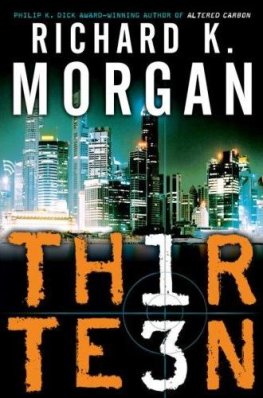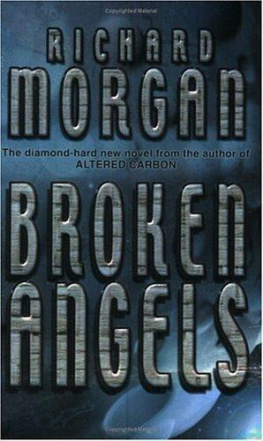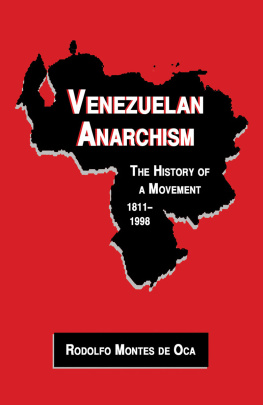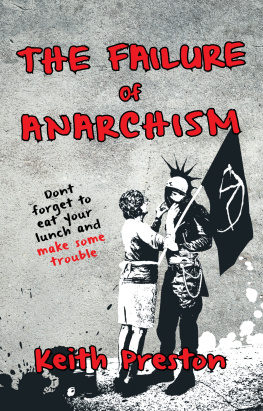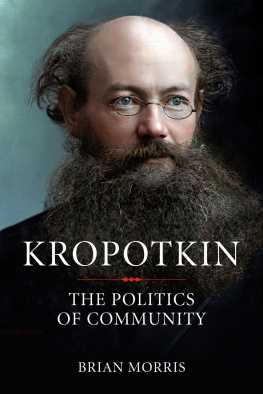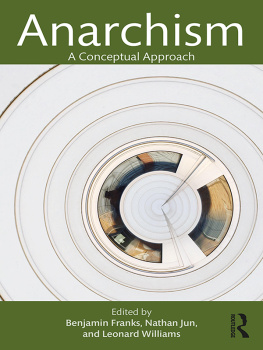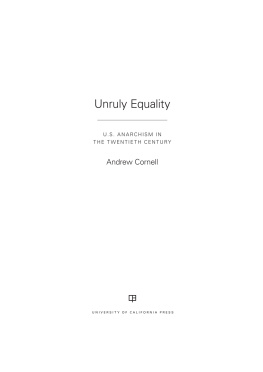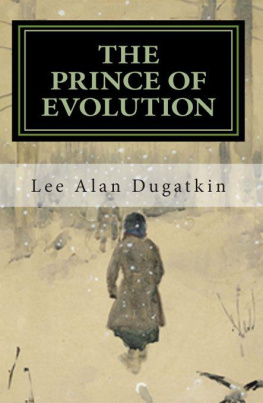The Making of Kropotkins Anarchist Thought
This book argues that the Russian thinker Petr Kropotkins anarchism was a bio-political revolutionary project. It shows how Kropotkin drew on late nineteenth- and early twentieth-century European and Russian bio-social-medical scientific thought to the extent that ideas about health, sickness, insanity, degeneration, and hygiene were for him not metaphors but rather key political concerns. It goes on to discuss how for Kropotkins bio-political anarchism, the state, capitalism, and revolution were medical concerns whose effects on the individual and society were measurable by social statistics and explainable by bio-social-medical knowledge. Overall, the book provides a refreshing, innovative approach to understanding Kropotkins anarchism.
Richard Morgan completed his doctorate at the School of Slavonic and East European Studies, University College London.
BASEES/Routledge Series on Russian and East European Studies
Series editors:
Sociology and anthropology: Judith Pallot (President of BASEES and Chair), University of Oxford
Economics and business: Richard Connolly, University of Birmingham
Media and cultural studies: Birgit Beumers, University of Aberystwyth
Politics and international relations: Andrew Wilson, School of Slavonic and East European Studies, University College London
History: Matt Rendle, University of Exeter
This series is published on behalf of BASEES (the British Association for Slavonic and East European Studies). The series comprises original, high-quality, research-level work by both new and established scholars on all aspects of Russian, Soviet, post-Soviet and East European Studies in humanities and social science subjects.
130 US Foreign Policy Towards Russia in the Post-Cold War Era
Ideational Legacies and Institutionalised Conflict and Co-operation
David Parker
131 Tolstoys Political Thought
Christian Anarcho-Pacifist Iconoclasm Then and Now
Alexandre Christoyannopoulos
132 Azerbaijan and the European Union
Eske Van Gils
133 Freedom of Expression in Russias New Mediasphere
Edited by Marille Wijermars and Katja Lehtisaaris
134 The Russian State and Russian Energy Companies, 19922018
Ingerid M. Opdahla
135 The Making of Kropotkins Anarchist Thought
Disease, Degeneration, Health and the Bio-political Dimension
Richard Morgan
136 From German Knigsberg to Soviet Kaliningrad
Appropriating Place and Constructing Identity
Jamie Freeman
For a full list of available titles please visit: www.routledge.com/BASEES-Routledge-Series-on-Russian-and-East-European-Studies/book-series/BASEES
The Making of Kropotkins Anarchist Thought
Disease, Degeneration, Health and the Bio-political Dimension
Richard Morgan
First published 2021
by Routledge
2 Park Square, Milton Park, Abingdon, Oxon OX14 4RN
and by Routledge
52 Vanderbilt Avenue, New York, NY 10017
Routledge is an imprint of the Taylor & Francis Group, an informa business
2021 Richard Morgan
The right of Richard Morgan to be identified as author of this work has been asserted by him in accordance with sections 77 and 78 of the Copyright, Designs and Patents Act 1988.
All rights reserved. No part of this book may be reprinted or reproduced or utilised in any form or by any electronic, mechanical, or other means, now known or hereafter invented, including photocopying and recording, or in any information storage or retrieval system, without permission in writing from the publishers.
Trademark notice: Product or corporate names may be trademarks or registered trademarks, and are used only for identification and explanation without intent to infringe.
British Library Cataloguing-in-Publication Data
A catalogue record for this book is available from the British Library
Library of Congress Cataloging-in-Publication Data
A catalog record for this book has been requested
ISBN: 978-1-138-36565-0 (hbk)
ISBN: 978-0-429-43061-9 (ebk)
Typeset in Times New Roman
by Apex CoVantage, LLC
For S. M.
Contents
PART I
Knowledge and methods
PART II
Diagnoses and remedies
Guide
I thank the Arts and Humanities Research Council and the School of Slavonic and East European Studies for funding my research. I thank Dr Tim Beasley-Murray, Dr Robin Aizlewood, Dr Jonathan Baldwin, and Dr Daniel Beer, whose contributions to the development of my work and ideas have been invaluable. I thank the Library of Congress, the British Council China, Nanjing University, South China University of Technology, Herzen Pedagogical Institute, Loughborough Universitys Anarchist Research Group, Royal Holloway University, the School of Slavonic and East European Studies, University College London, and the British Library. And I thank my family and friends for discussing, questioning, and challenging my work. I also thank you for taking my mind off it.
R.M.
What would you prescribe for all these sicknesses?
(Petr Kropotkin, 1880 republished 1992, p. 45)
Petr Kropotkins [18421921] political thought engaged with the double-sided task of diagnosing humanitys sicknesses and prescribing remedies to cure them. The question from To the Young [1880] set as an epigraph to this book conveys a mutuality between problem and solution that was central to the way he thought about politics. For roughly half a century Kropotkin worked on discovering threats posed by modern political and economic environments to individuals and society as a whole. He sought to reveal these threats, understand their danger, and analyse their effects. Alongside his political diagnoses, Kropotkins writings also attempted to identify political treatments that could heal and improve humanitys condition. Showing what was wrong with human beings was meaningful to Kropotkin because it suggested to him how they ought to be. Once located and known, the problems humanity faced could be overcome.
This book studies Kropotkins political diagnoses and remedies in relation to forms of knowledge and practices that he believed made them possible. Kropotkin was explicit about making this connection, and he went to great lengths to show which ways of knowing the world would form the basis of his political ideas. In 1901, he gave expression to his view of the association:
It is important to know the position it [anarchism] occupies among the various currents of scientific thought that exist at the present time . To which of them does it turn for support? Which method of research does it make use of in order to prove its conclusions?
(1901 republished 1923, p. 6)
My research provides answers to these questions, examining how nineteenth- and early twentieth-century scientific thought influenced and informed Kropotkins understanding of what is politically undesirable and desirable. In other words, I analyse how science supported his attempts to identify political problems and solutions and how he drew on scientific methodological practices in order to prove the conclusions of his political arguments. At the heart of this book, then, is an exploration of the interplay between knowledge and politics, a reading of the relationship between epistemology and the political concepts of status quo and transformation.


